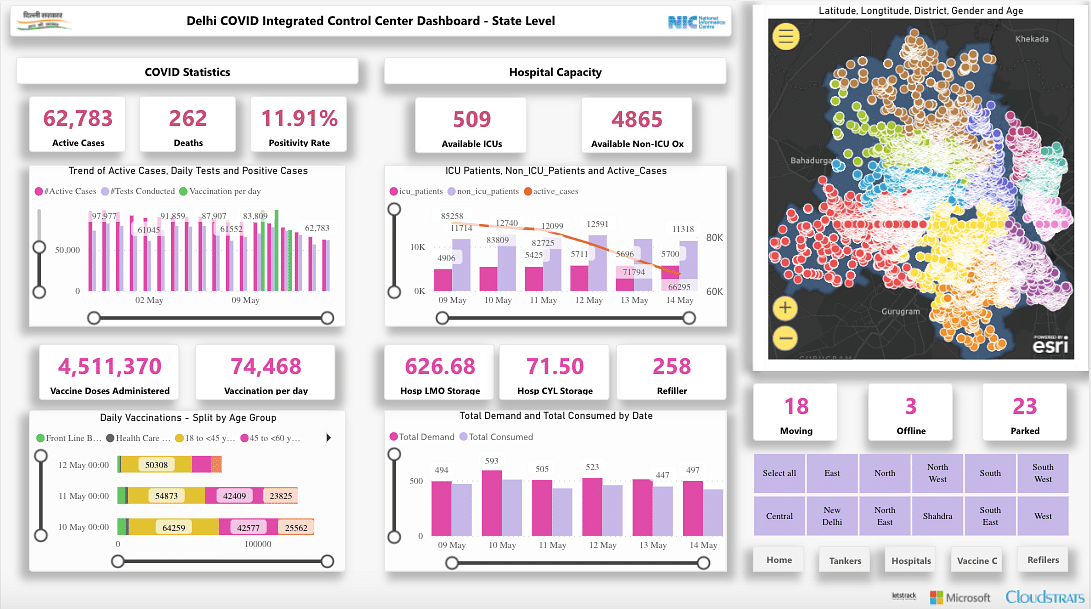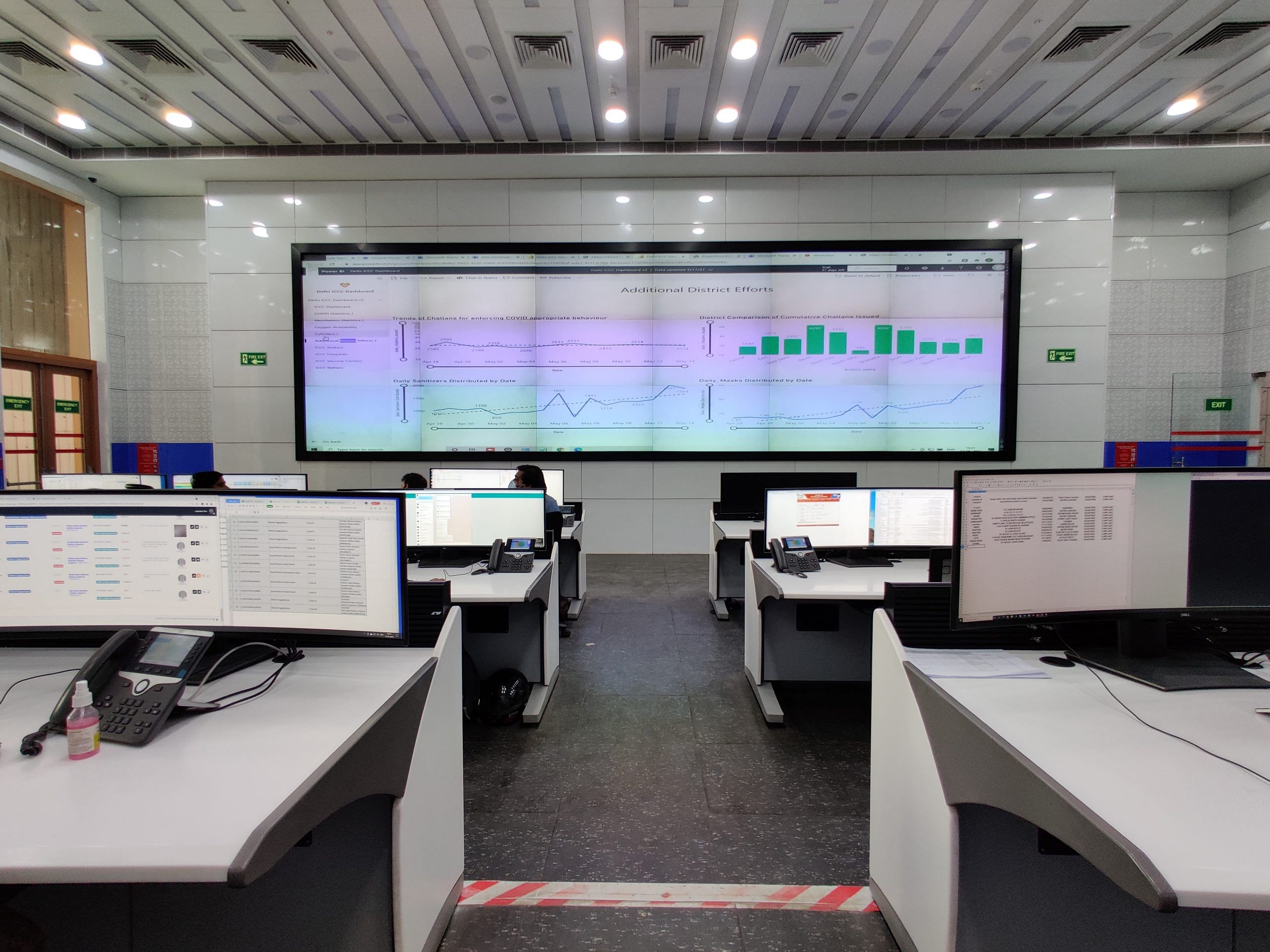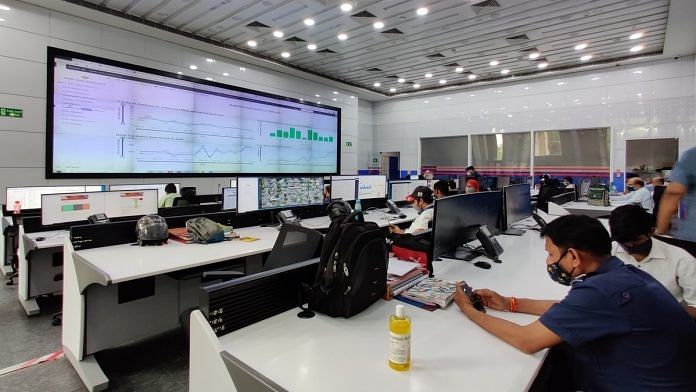New Delhi: Across the reception of the New Delhi Municipal Council (NDMC) building in Palika Kendra, it’s hard to miss the nearly two dozen workers who remain glued to their chairs and desktops, with a big screen on a wall facing them.
The screen displays the national capital’s Covid-19 statistics — cases, beds and oxygen availability, vaccination, etc — in the form of graphics.
This is the Delhi government’s newly-inaugurated Integrated Command and Control Centre (ICCC). It isn’t yet much in action like, say, the Covid war room in Mumbai, even if the attempt is to create the same buzz.
The move came as the Aam Aadmi Party-led Arvind Kejriwal government drew flak for having failed to have a one-stop centre to provide data in the national capital, especially amid the massive surge in cases and deaths, and oxygen shortage over the last few weeks.
On Saturday, CM Kejriwal launched the facility, saying data “related to hospitals, oxygen, vaccination and other aspects of covid management are collected, collated and analysed on real time basis” to help the government in “informed decision making”.
Delhi govt has started an Integrated Command and Control Centre (ICCC). Data related to hospitals, oxygen, vaccination and other aspects of covid management are collected, collated and analysed on real time basis. It will help us in making informed decision making pic.twitter.com/WWrmP1VJxS
— Arvind Kejriwal (@ArvindKejriwal) May 15, 2021
The centre is meant to collate and analyse data on a real-time basis, so as to provide Delhi government’s departments and residents with up-to-date information. But three days since its launch, neither the ICCC dashboard has real time data nor is it accessible to the public yet — via the Delhi Covid data management portal homepage, as planned.
During ThePrint’s visit to the centre on 17 May, the dashboard carried updates from 15 May’s bulletin. The vaccination charts were in even worse state — updated only till 14 May.

Devoid of real-time updates — as of Tuesday — this initiative works more as a data feeder on a single platform as opposed to being a guiding force to aid the government, and patient coordination on the ground.
This comes even as the CM said Saturday the decision on how much data will be provided to the public will be reviewed later.
Speaking to ThePrint on the issue, Prince Dhawan, special commissioner of trade and taxes in the Delhi government, who is in-charge of the facility at the NDMC, said the idea is to provide more and more robust data to manage Covid.
“We are in the process of updating multiple things in the portal so that the dashboard has real figures,” he says.
Also read: ‘If I wasn’t sent for poll duty…’ — MP teacher a wreck after Covid kills pregnant wife, mom
What the ICCC entails
The Delhi government officials deputed at the ICCC are categorised into three groups on the basis of the nature of their work.
The first group features data entry operators. The second includes callers, who primarily coordinate with hospitals and other stakeholders about availability of beds and oxygen, and monitor the availability of figures. The third group features senior government officials, who analyse the data before the visualisations are made for the dashboard.
Private players including Microsoft and Cloudstrats Technologies are helping the Delhi government on data visualisation. The dashboard is being maintained by the government’s National Informatics Centre.

Priyanshu Yadav, one of the in-charges at the ICCC, said: “The categorisation (of workers) enables smooth functioning of work.”
Each of these teams is also connected through WhatsApp groups with each other as well as with other departments of the Delhi government to source information, he said.
For instance, the ICCC team is regularly in touch with stakeholders like hospital administrations, oxygen tanker staff, refillers, oxygen plant teams in other states, district officials in Delhi and Geo Spatial Data Centre team, among others, Yadav added.
Also read: VK Paul — teacher, paediatrician, top technocrat & the face of Modi govt’s Covid battle
How the teams are working
Speaking to ThePrint, Abhijeet and Manoj Kumar, two data entry operators, said their team works in daily shifts running from 10 am to 8 pm to update details on the dashboard district-wise.
The data points range from the number of challans issued for failing to follow Covid-appropriate behaviour; the number of sanitisers distributed in a district in a day; number of home isolation patients; and details about active cases, deaths and vaccination.
Callers, who are teachers in Delhi government schools, detail how they are expected to follow up with hospitals if the latter fail to update the ICCC over email or WhatsApp groups on a particular day.
Flipping through sheets containing a list of hospitals in Delhi, caller Anurag Yadav said, “We tell them to update daily figures by 11 am — such as number of patients admitted, discharged, deaths, recoveries, but things like oxygen availability, we try and update every hour so that it can reflect in the dashboard.”
The physical space of the ICCC was already in use for NDMC’s Smart City project. At least two rows of workers at the facility were actually from the NDMC, who look at sanitisation requests, among others. This work is completely unrelated to the ICCC.
No real time updates yet
With no real-time updates yet, there are concerns about the impact of the centre. Dhawan admitted to this, but said the situation will improve in a couple of days. “It is a new initiative and hence we are still in the process of streamlining things and things should look up in two-three days.”
The lack of updates reflects in the quality of the data on the dashboard. For instance, the district-wise data for daily vaccination is available but not that of vaccine doses given to each gender.
Dhawan said: “The idea is to ensure we receive all this information in time from all stakeholders for us to put it out and speed up things. Soon enough, we will be in a better spot.”
While details of 244 hospitals are being provided for the dashboard, officials involved in the process said some more Covid hospitals are yet to give updates, which has also delayed the real-time updates for the dashboard. Details of non-Covid hospitals will also be added to the dashboard so as to have empirical data on requirement of oxygen in Delhi.
Some senior officials in Deputy Chief Minister Manish Sisodia’s office told ThePrint that the intention behind coming up with such a unit was to enable better and informed decision-making when senior officials and ministers meet to review the situation.
“All this while, information would come from different departments or had to be collated depending on the task at hand. So say if the CM or someone wants to look at a particular aspect in a part of Delhi, it will all be available on this dashboard,” said an official associated with the project.
The official also shared that this is also to ensure that administration is well prepared should there be a third wave of the pandemic.
Delhi reported 4,524 new cases and 340 deaths Monday, with a positivity rate of 8.42 per cent.
Also read: 270 doctors across India succumbed to Covid in second wave of pandemic, says IMA



